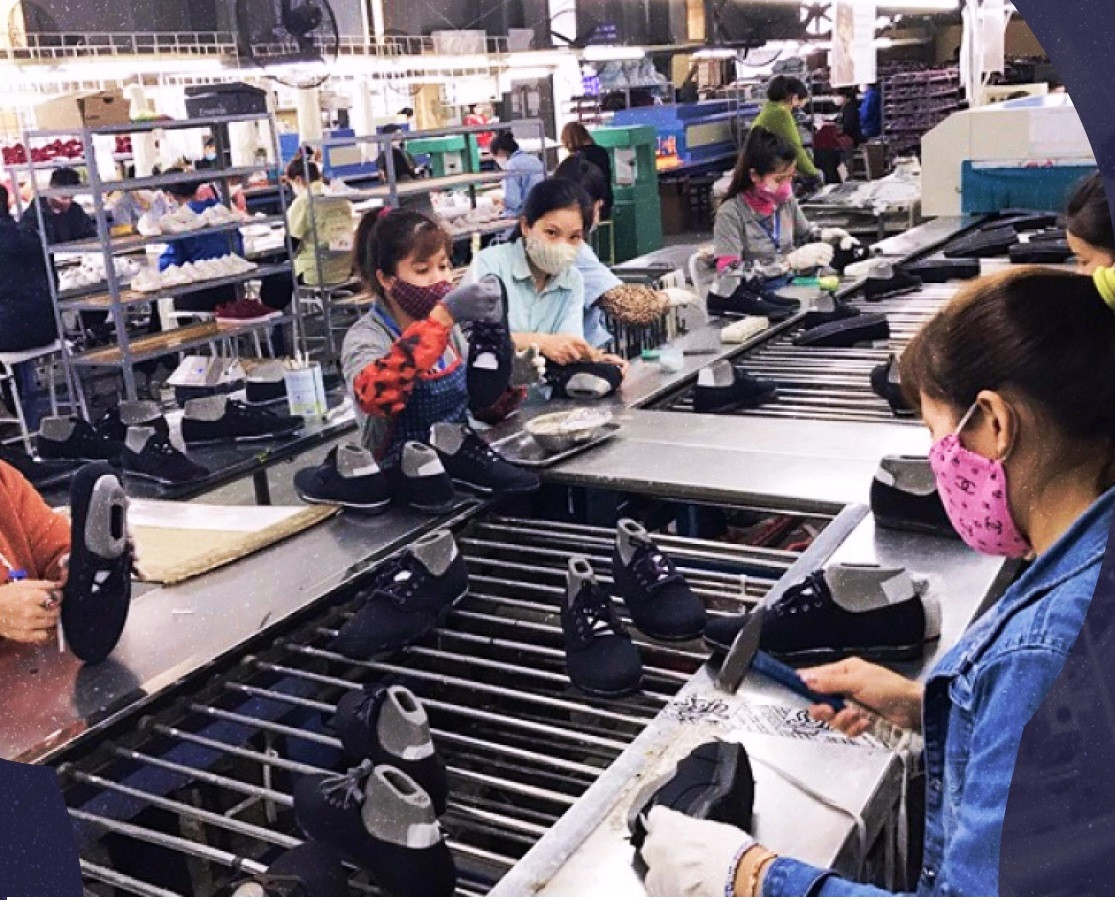
Recently, China has blocked many localities in order to fight Covid-19, disrupting global supply chains. As a large textile and garment enterprise of Vietnam, Viet Thang Corporation has to import each week three containers of raw materials from China worth over 80,000 USD to serve production.
Material sources from China account for about 30-40% of its total imported materials. However, more than two weeks ago, the materials could not be imported.
The firm’s managers said the Chinese partner could not announce the official delivery deadline, leading to a lack of raw materials for production.
In the same situation, Metect Joint Stock Company in Hung Yen province currently has an order of special stainless steel, imported from China, which has been delayed for more than half a month. The reason is that the supplier of raw materials has had to temporarily stop working to prevent the spread of Covid.
If raw materials cannot be imported for production, the company's orders will not be delivered on time, and customers can cancel the contract, Metect leaders said.
As the world's "factory", any disruption to exports from China will lead to a severe shortage of raw materials. Vietnam is suffering these impacts. Statistics of the Ministry of Industry and Trade show that in the first four months of 2022 China was Vietnam's largest import market, with turnover of 36.78 billion USD.
Imports from China are mostly raw materials for production. Therefore, the disruption of supply from this market causes many difficulties for enterprises.
In addition, the Russia-Ukraine conflict and the Covid pandemic have disrupted many other supply chains. While Vietnam is a country that imports raw materials to make exports, and input is heavily dependent on foreign countries, leading to difficulties and a sharp increase in prices.
According to a report of the Ministry of Industry and Trade, in the first four months of 2022, nearly 89% of Vietnam's total import turnover was raw materials for production, with a value of 106.6 billion USD, up 16.8% compared to the previous year. same period.
The General Statistics Office released data on the electronics industry, showing that in the first quarter of 2022, exports reached $29 billion, but imports reached $26 billion, mainly input materials and components. Thus, up to this point, the lack of initiative in input materials, still heavily dependent on imports, has negatively affected production development and economic growth of Vietnam.
Talking to Prime Minister Pham Minh Chinh during his recent visit to Harvard University (USA), economics professor David Dapice said that the participation in international trade agreements has been a great success for Vietnam.
However, one of the weak points of Vietnam's economy is that most production materials are imported from China. When the Covid outbreak occurred, the border was closed, affecting Vietnam's import and export goods. Vietnam needs to develop domestic inputs and diversify supply sources for export, Mr. Dapice suggested.
Opportunity in difficulty
Leaders of the Department of Industry (Ministry of Industry and Trade) said there must be long-term solutions to develop supporting industries and important basic material industries to overcome dependence on raw materials, imported input materials and components.
Decree No. 111/2015/ND-CP of the Government issued on November 3, 2015 defines supporting industries as “industries that produce raw materials, materials, components and spare parts for supply. for the production of finished products”.
With this definition, in the overall industry, supporting industries are the upstream and midstream industries, providing inputs for production of final products in the downstream region. Thus, the supporting industry is an important part of the supply chain and value chain.
Based on this definition, a survey by the General Statistics Office shows that there are currently nearly 5,000 enterprises operating in the field of supporting industries nationwide.
These enterprises supply raw materials, spare parts and components to enterprises producing final products. In terms of scale, 88% of supporting industry enterprises are small and medium sized, with 300 employees or less.
According to economic experts, Vietnam has an underdeveloped supporting industry, as well as many small businesses, limited resources, and outdated technology. The policies to encourage development are not attractive enough, and the difficulties are too great, so Vietnamese enterprises mainly do commercial business, in which many enterprises run after short-term profits, want to get rich quickly, and work hard, or invest in real estate and stocks to make a profit.
Currently, Vietnam needs a lot of medium-sized enterprises to participate in the production of raw materials and increase the competitiveness of industries, instead of depending on imports.
Mr. Nguyen Hoang, Chairman of the Association of Supporting Industry Enterprises in Ho Chi Minh City, said we have a very large market for supporting industries in the field of manufacturing, up to hundreds of billions of dollars per year, but it is ignored. If the supporting industry makes a great contribution, as a manufacturer and supplier of raw materials and components, it will help increase the localization rate and create a developed processing and manufacturing industry.
Not only that, it also helps to improve the country's self-reliance and independence and competitiveness in the global market, gradually getting rid of dependence on resources from outside.
Economic experts recommend that, in the face of current difficulties, it may also open up opportunities. In order for the supporting industry to develop, it is necessary to establish a State-level Steering Committee to solve difficulties and promote the supporting industry.
Specific planning for each economic regions needed to develop supporting industries. There are urgent and specific solutions on preferential capital for supporting industries, high-quality labor training, and technology support for supporting industry enterprises. Connecting FDI enterprises with Vietnamese enterprises to participate in the supply chain, and having policies to encourage FDI enterprises to increase localization are important.
It is also necessary to have incentive policies for people to start their own businesses to invest in production instead of trading land and playing securities.
Tran Thuy